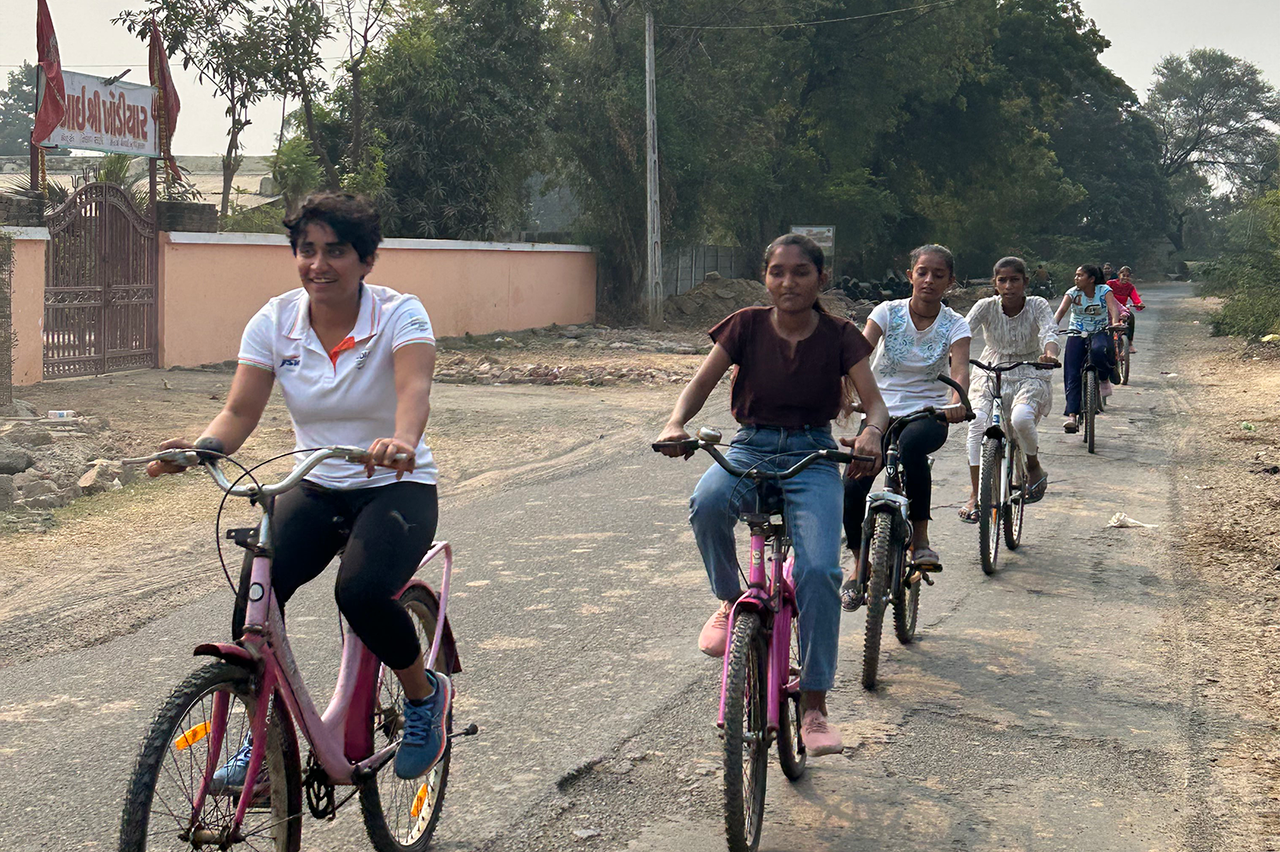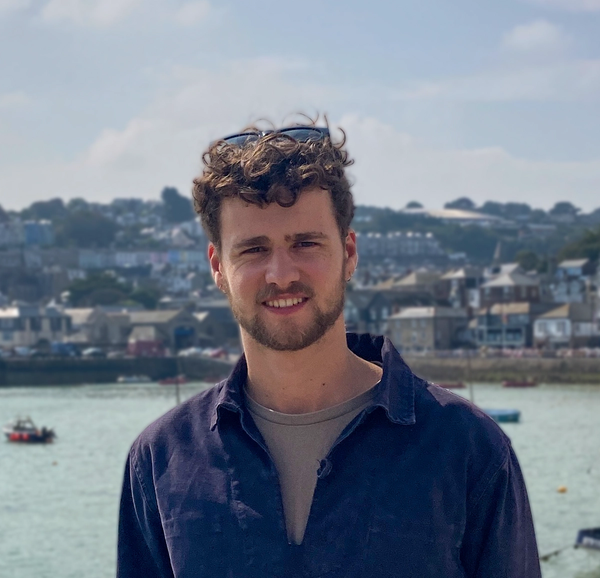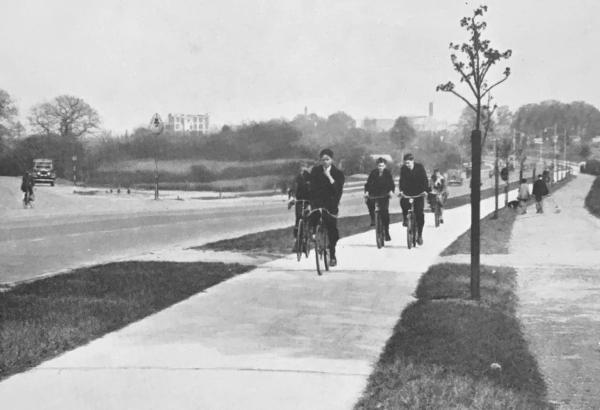Pragnya Mohan: Every girl in India should have access to a cycle
An Indian triathlete is giving bikes to underprivileged girls, giving them freedom, fitness and access to education
James Howell-Jones
Junior Writer
© Pragnya Mohan
Pragnya Mohan leads the first cohort of girls on a ride
For underprivileged girls in India, a bike can mean access to education or employment, a sense of freedom, and a possession to call their own. Unfortunately, bikes are a luxury many girls could never afford. To resolve that, Pragnya Mohan, India’s most successful triathlete, is building a program to give free bikes to girls who need them, and she has won the backing of the International Olympic Committee to achieve it.
Now, after a successful small-scale pilot of the scheme in the surroundings of her home city, Mohan is ready to upscale. Next year, she plans to give away 1,000 bikes to girls, which she says will increase the number of girls in school, and enable them to access better employment.
Quite simply, Mohan believes that “every girl in India should have access to a cycle”.
As her project progressed into the crucial second stage, GCN spoke to her to find out more.
Read more: 3,000 bikes and counting: The one-man mission to get kids on bikes, for free
The idea
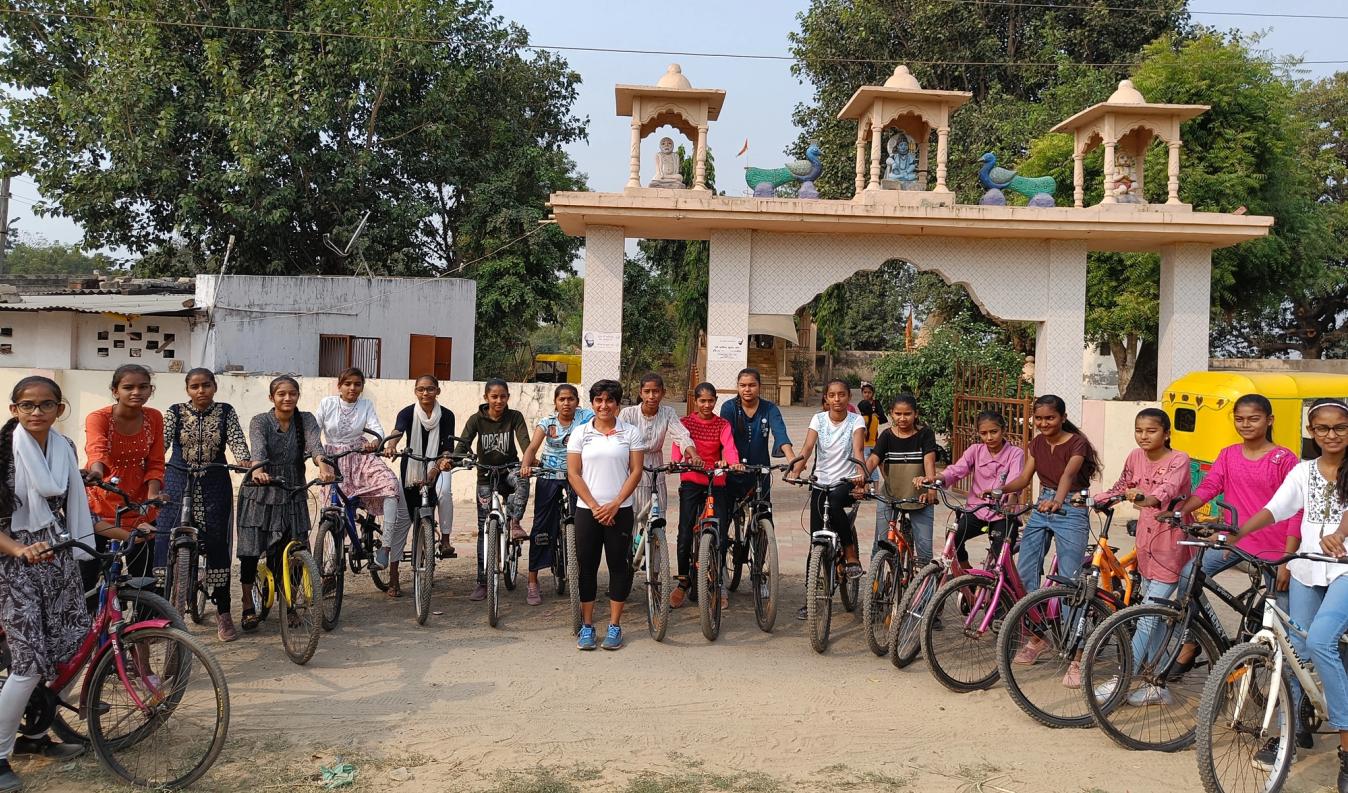
© Pragnya Mohan
Pragnya Mohan with the girls at Ratapura village
Typically, in India, every village has a primary school and middle school, but to get to secondary school, children need to travel a few kilometres further. Subsequently, when they enter high school, middle class children tend to ‘graduate’ from a bicycle to a motorbike or scooter. In most cases, their bicycle is relegated to a dusty garage, where it remains, untouched, for years.
Basements and garages of apartment buildings across India are bursting with deserted bicycles, many of which are in working order. “It's actually kind of a nuisance for the society,” Mohan explains, “because they occupy space and often no one knows who the owner is.”
Meanwhile, in less well-off villages outside the city, underprivileged children face a new challenge when they reach high school age. Almost every village has a middle school, but high schools are situated in larger towns. With their new school usually too far away to walk, education becomes something of a luxury; to attend, students must pay for transport. Subsequently, many children who should be entering high school, particularly girls, drop out.
“There is almost a drop of 40 per cent of girls going from the 8th to the 9th standard,” Mohan explains, “because the distance increases from the school being within their village, to them having to commute up to five kilometres to get to the next school.”
About a year ago, Mohan had an idea. She wanted to set up a program that recovered the underutilised bikes, and gave them to girls who needed them to get to school or work.
The project
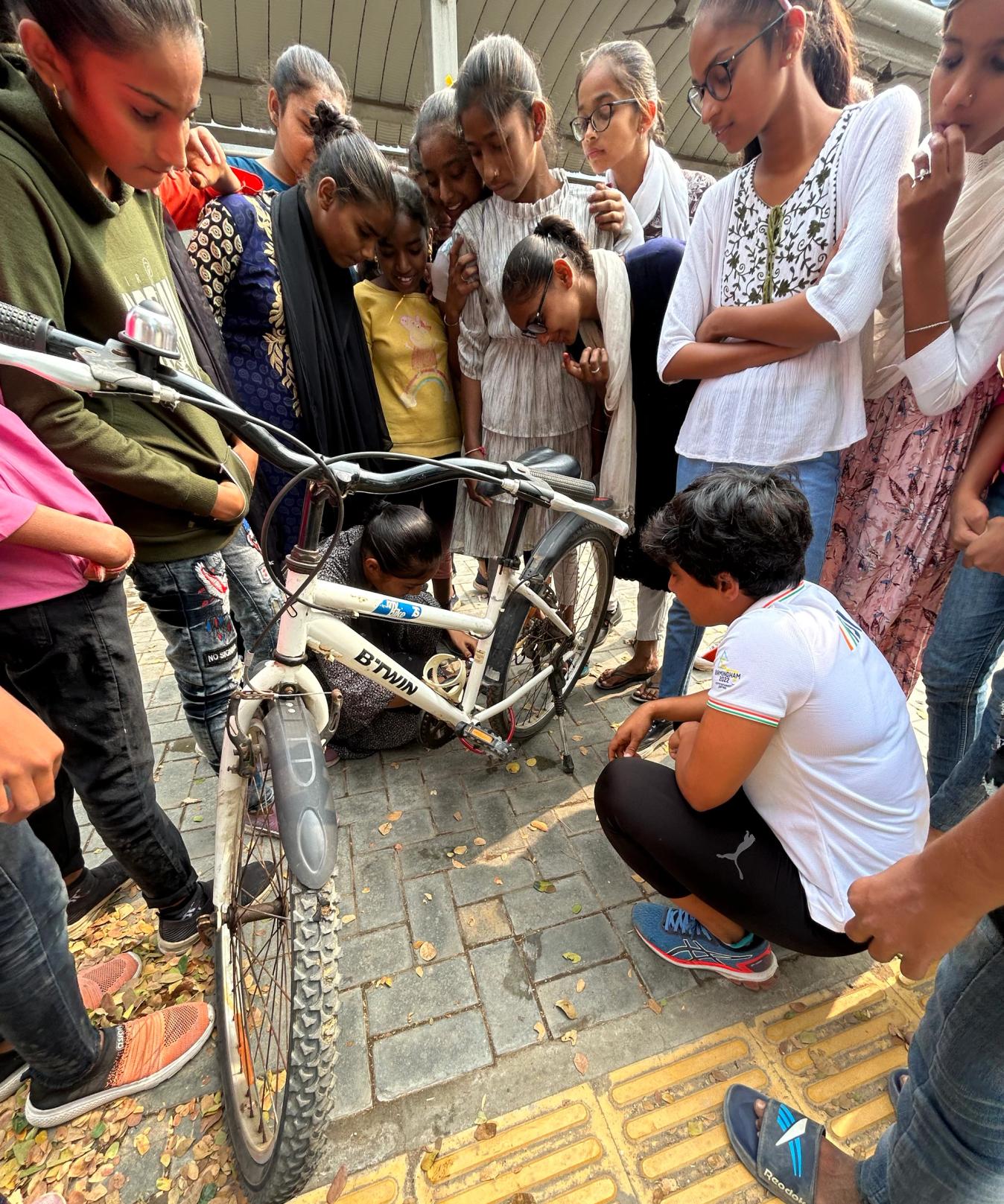
© Pragnya Mohan
Pragnya Mohan teaches the girls how to do basic bike maintenance
Mohan submitted her idea to the International Olympic Committee (IOC), and was named as one of the IOC’s 25 ‘Young Leaders’, a highly selective cohort of remarkable people using sport to improve lives. As an IOC Young Leader, she has received a modest amount of funding, as well as support and training, which Mohan is now using to bring her vision to life.
Last month, Mohan wrapped up the pilot of her scheme. She paired with a local school, who highlighted a group of 22 girls who needed a bike. Each of them were from underprivileged backgrounds, and lived over 5km away from school.
Then, with the help of friends and family, Mohan “went door to door to ask for cycles".
One by one, they collected and refurbished enough bikes, but they couldn’t simply drop them at the school and call it a day. Mohan then had to teach the girls how to ride a bike, and then how to ride on the open road.
“We had a six day long camp in which we taught girls how to cycle. Some of them already knew how, so we took them on trips because they had never gone far. We took them on 8-10km trips for four days, which build their confidence to cycle on public roads.”
Read more: A new cycling club for blind people in Scotland
Impact on the girls who received bikes
This first group of new female cyclists might be small compared to Mohan’s plans for 2024, but the impact on each individual is enormous.
Of course, the bikes made it easier and cheaper to get to and from school. Mohan says the bikes save each of the girls about 800 rupees a month, or about $10, that they’d otherwise spend on public transport. For underprivileged families in these regions, that’s a meaningful saving.
Just as important as the financial savings though, is the freedom that comes with owning a bicycle. “For most of these girls, this cycle will be their first ever possession,” Mohan explains. With it, they can explore new places, enjoy being outside, and improve their fitness.
“In India, there’s still this idea that, especially with girls, the family would want to know where they are, or they would be with some elderly person taking them everywhere that they go.
“So the freedom that they got from cycling and the freedom of not being chaperoned, you could see they were very happy with that.”
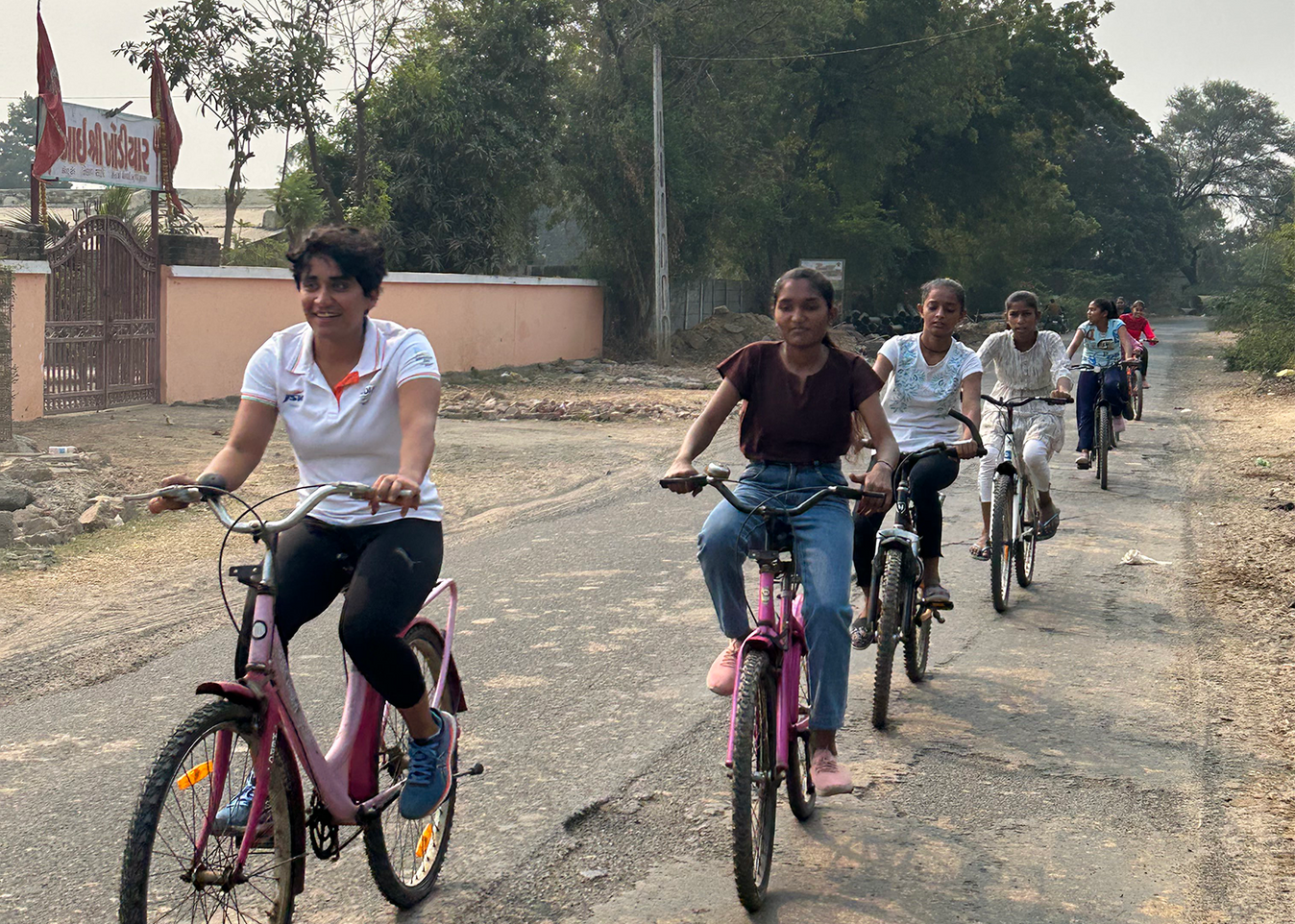
© Pragnya Mohan
Pragnya Mohan leads the girls on a bike ride
Mohan hopes that the independence they’ve picked up on the bike will carry through to other parts of their lives.
“Their confidence in general will also improve, hopefully, because now they're becoming independent. They don't have to depend on someone else.”
Finally, the bikes will have a big impact on the girls’ fitness. As an elite athlete herself, Mohan was shocked to see that some of the girls struggled to ride the distances of a few kilometres between villages.
“I thought, ‘okay, it's only 10 kilometres that we're going to make them cycle, it isn’t huge’, until we saw that one of the girls actually fainted.”
Now, with the coaching over, the girls are well accustomed to cycling the distance of a few kilometres from their home village to school. In fact, it’s a journey that most of them now make every morning and afternoon.
Upscaling
The pilot gave Mohan a chance to test out her plan. Now, it’s time to upscale. As she enters her second year as an IOC Young Leader, Mohan’s funding goes from a small sum to help with an initial pilot, just 1,00 Swiss Francs ($1,171), to 5,000 Swiss Francs ($5,812). With more experience and more cash, Mohan plans to provide 1,000 bikes to schools in and around her home city of Ahmedabad.
“It's the 10th biggest city in India,” she says of Ahmedabad. “It has a population close to 8 million people at the moment, so it is quite big. According to the surveys that we saw, we could reach villages around the city, and we could reach up to 2000 girls within this vicinity and then probably expand.”
Of course, Mohan can’t source all those bikes by knocking on doors.
“So we are planning to go to private schools and pitching this to the students,” she explains. “They're primarily 8 to 12 standard [grade] students who we think might not be using their cycles anymore. We're going to pitch this idea to them, tell them what we are trying to do; that there are similar students, children elsewhere in the country who do not have the privilege of having a cycle to commute to schools.
“As we do some more numbers and we gain some popularity, we hope that a lot of societies and a lot of schools actually come on board and tell us that they want to donate cycles because there are many cycles out there.”
Mohan says that bike donations are the bottleneck at the moment, but she’s confident that once word has spread, the donations will come easier. As we learnt when we visited Mike Jones, a man who has created a similar initiative in Wales, UK, they likely will.
The future
Alongside the bikes for school children, Mohan wants to broaden her scope as the project develops. With the guidance of local sarpanches, the heads of each village, she is drawing up a list of girls who need bikes to commute to work. The goal is to open the door to better employment opportunities.
“We want them to be able to commute to whatever employment locations they want to go to and probably improve their reach to better employment.”
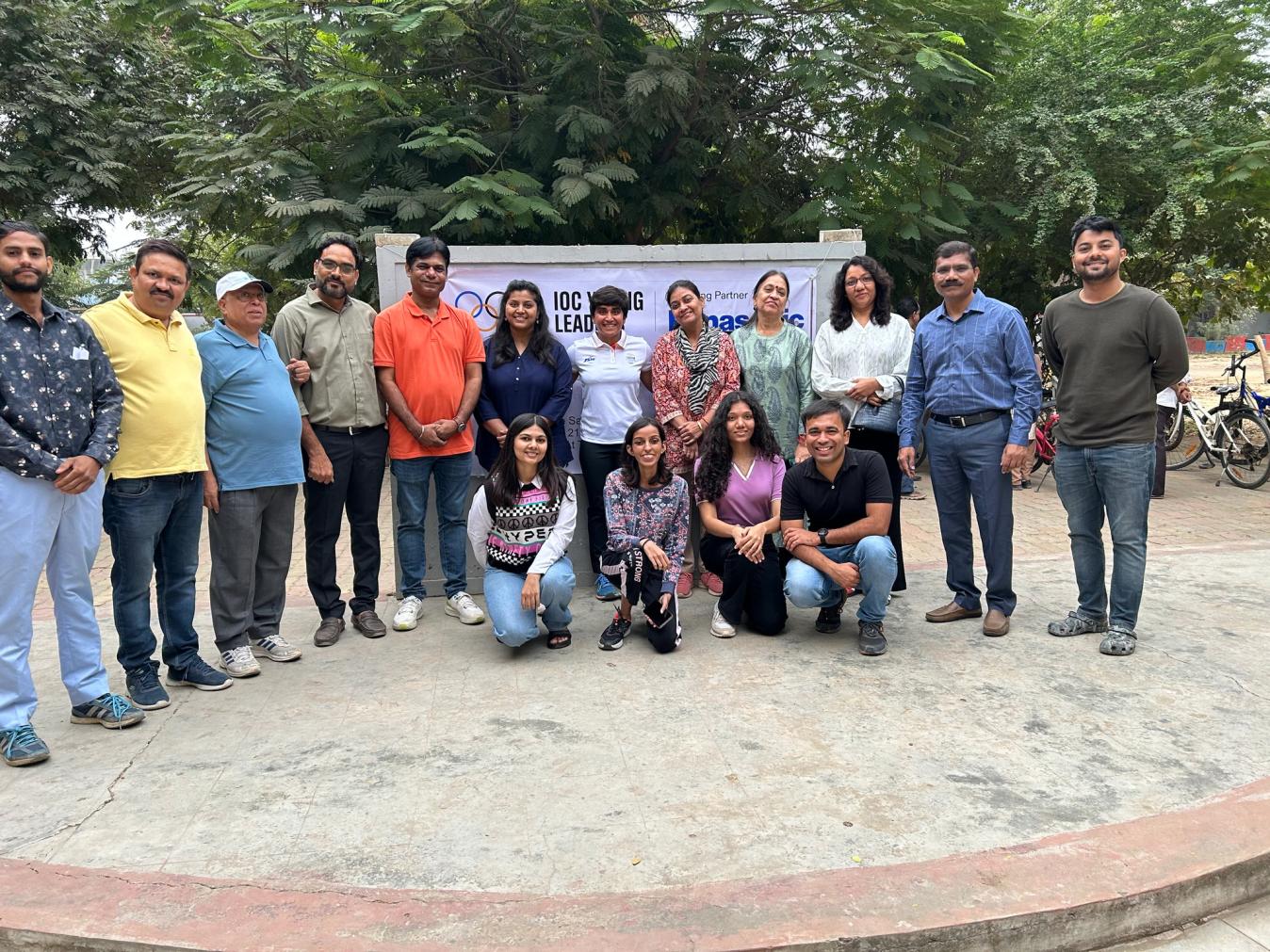
© Pragnya Mohan
The people who have brought the project to this stage
The scale and scope of Mohan’s scheme is due to expand as we prepare to welcome in the new year. With her pilot complete, she has learnt that to make a scheme like this effective, she must do more than simply hand out free bicycles.
For girls who have never had the freedom to travel alone, nor the means to learn to ride a bike, coaching and nurturing is a crucial step to fostering school girls into confident cyclists. Once she’s found a reliable source for bike donations, scaling up her time-intensive coaching regimen will be Mohan’s next challenge.
With the support of friends, family, local schools and the International Olympic Committee, we’re sure it’s one she will rise to and overcome.
